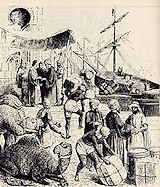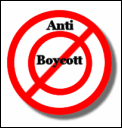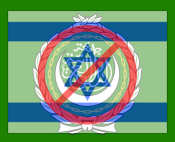
ABOVE: Polk Audio HQ
Here’s the thing: you can save yourself money if you read this blog. You can certainly avoid paying money to the Office of Antiboycott Compliance (“OAC”) at the Bureau of Industry and Security (“BIS”) if you read this blog. Polk Audio could have saved itself the $8,000 penalty, announced here, that it paid OAC if it had read this blog.
The OAC is a vestigial appendage over at BIS which arguably had no further right to exist after the expiration and non-renewal of the Export Administration Act. It is doubtful that the President can rely on any emergency to justify resurrecting OAC from the dead by an executive order under IEEPA as each president has done since the EAA expired. Accordingly, OAC keeps a low profile and never fines anyone enough to make it financially worthwhile for an exporter to pop into court and challenge its statutory authority. And, it seems that OAC fines exporters for one simple, but obscure, violation over and over and over. We have reported on this many times, including here and here.
The grave sin at issue involves certifications that ships are entitled to enter certain ports. Some Arab League countries don’t permit ships to enter their ports if the ship has previously entered a port in Israel. The thing is there are exceptions from the non-compliance and reporting requirements precisely for such certifications. Under Supplement 1 to the antiboycott rules:
the owner, charterer, or master of a vessel may certify that the vessel is “eligible†or “otherwise eligible†to enter into the ports of a boycotting country in conformity with its laws and regulations.
And under section 760.5(a)(5)(viii) of the antiboycott rules, an exporter need not report:
A request to supply a certificate by the owner, master, charterer, or any employee thereof, that a vessel, aircraft, truck or any other mode of transportation is eligible, otherwise eligible, permitted, or allowed to enter, or not restricted from entering, a particular port, country, or group of countries pursuant to the laws, rules, or regulations of that port, country, or group of countries.
The catch here is that only an owner, master or charterer of the vessel may supply that information. An agent of the owner, master or charterer may not supply that information and a request that an agent supply that information (even if it is ultimately supplied by the owner, master, or charterer) must be reported.
Polk was charged with two violations. The first involved Polk itself certifying, as agent for the carrier, that a vessel was allowed to enter the “ports of Arab States/Oman.” The second involved receiving, and not reporting, a letter of credit that demanded a certification from the “owners, agents or master” that the vessel was allowed to enter the “ports of Arab States/Oman.” Once again, an exporter got in trouble for not knowing that the agent couldn’t supply the information and that a request for an agent to supply the information was reportable.
This is just about all that OAC nails people for anymore, so repeat after me: “Agents can’t certify that ships are allowed to enter Arab Ports.” Now say that to everyone in your company. If everybody gets this message, the folks at OAC will have nothing left to do but play Words With Friends and update their Facebook pages.

 Posted by
Posted by  Category:
Category: 


 Perhaps in order to remind everyone that it still exists, the the Bureau of Industry and Security’s Office of Anti-Boycott Compliance (“OAC”) issued a
Perhaps in order to remind everyone that it still exists, the the Bureau of Industry and Security’s Office of Anti-Boycott Compliance (“OAC”) issued a  The Office of Antiboycott Compliance of the Bureau of Industry and Security (“BIS”) released a
The Office of Antiboycott Compliance of the Bureau of Industry and Security (“BIS”) released a  The Texas subsidiary of German logistics and transportation provider
The Texas subsidiary of German logistics and transportation provider 

